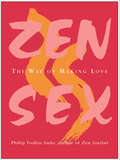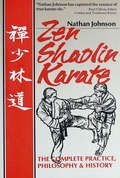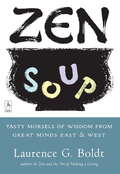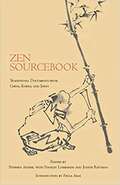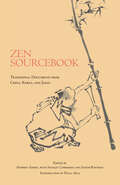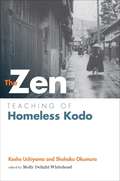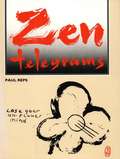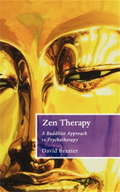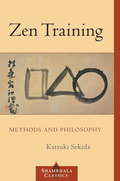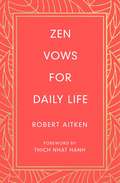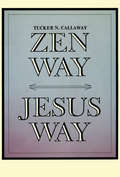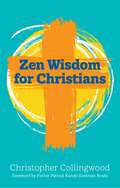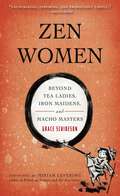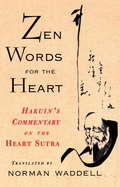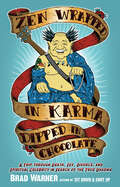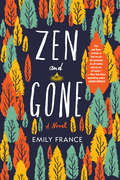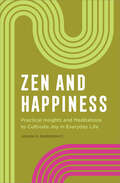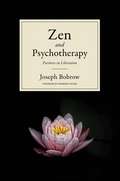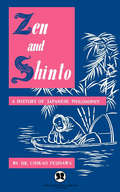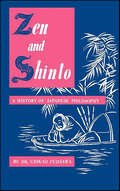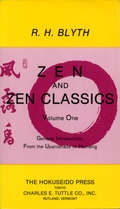- Table View
- List View
Zen Sex: The Way of Making Love
by Philip Toshio SudoZen philosophy tells us that the great truth of the universe applies to all things at all times. Every moment of life, from guitar playing to working at the computer, to making love, offers a chance for Zen realization. Just awaken to that truth, Zen masters say; how and where do not matter. Sex offers the same opportunity for enlightenment as anything else. Zen Sex guides readers to the realization of that opportunity with "The Ten Stages of Zen Sex" and "The Six Principles in the Way of Making Love." Philip Sudo reminds our sex-obsessed age that not only is sex a fundamentally spiritual endeavour, it is indeed sacred. This elegant, gorgeous book will appeal not only to Zen practitioners, but to any one looking for enlightenment and spirituality in all aspects of life.Great gift potential.Good for the sex book audience, Zen practitioners and readers looking for meaningful sex.While there are quite a few books that deal with spirituality and sex from the Tantric and Taoist tradition, no other book has brought together Zen and sex.Easy-to-do practices help readers learn and experience Zen sex.
Zen Shaolin Karate
by Nathan JohnsonIn Zen Shaolin Karate, Johnson explains and illustrates in precise detail every subtle movement of two of karate's most common kata, and provides historical testimony for his explanations by integrating his findings with Zen philosophy. The author's unique interpretations of the Nai Fuan Chin and Saam Chin kata will destroy the barriers separating karate, kung fu, and aikido, and will revolutionize how kata are applied in all karate styles.
Zen Shaolin Karate
by Nathan JohnsonIn Zen Shaolin Karate, Johnson explains and illustrates in precise detail every subtle movement of two of karate's most common kata, and provides historical testimony for his explanations by integrating his findings with Zen philosophy. The author's unique interpretations of the Nai Fuan Chin and Saam Chin kata will destroy the barriers separating karate, kung fu, and aikido, and will revolutionize how kata are applied in all karate styles.
Zen Soup (Compass)
by Laurence G. BoldtIf, as the I Ching says, thoughts are spirits, then this collection of highly distilled thoughts from history?s greatest philosophers and religious figures will certainly put you in good spirits. <P><P>Laurence Boldt has long made a practice of applying Zen principles to everyday life. Here he applies wisdom from all corners of the world to twenty-five aspects, or qualities, associated with the Zen tradition. The result is a soup of the most hearty and wholesome kind, well-seasoned with age, and filled with delicious surprises: ?Where your talents and the needs of the world cross, thence lies your vocation.? --Aristotle ?A man with outward courage dares to die: A man with inward courage dares to live.? --Lao Tzu You?ll also find Flip Wilson on living in the moment; Will Rogers on the beginner?s mind; Helen Keller on courage; Chekhov on self-confidence; and Colette on joy. Each chapter includes an entertaining and informative essay that explains the principle and its application to Zen wisdom. The rest is up to you. Read it in one gulp or savor each morsel. Either way, Zen Soup is sure to whet your spiritual appetite as it nourishes your soul.
Zen Sourcebook: Traditional Documents From China, Korea, And Japan
by Stanley Lombardo Stephen Addiss Judith Roitman Paula Arai"Featuring a carefully selected collection of source documents, this tome includes traditional teaching tools from the Zen Buddhist traditions of China (Ch'an), Korea (Son), and Japan (Zen), including texts created by women. The selections provide both a good feel for the varieties of Zen and an experience of its common core. . . . The texts are experiential teachings and include storytelling, poetry, autobiographies, catechisms, calligraphy, paintings, and koans (paradoxical meditation questions that are intended to help aspirants transcend logical, linguistic limitations). Contextual commentary prefaces each text. Wade-Giles transliteration is used, although Pinyin, Korean, Japanese, and Sanskrit terms are linked in appendixes. An insightful introduction by Arai contributes a religious studies perspective. The bibliography references full translations of the selections. A thought-provoking discussion about the problems of translation is included. . . . Summing Up: Highly recommended. All levels." --Choice
Zen Sourcebook: Traditional Documents from China, Korea, and Japan
by Stanley Lombardo Stephen Addiss Judith Roitman"Featuring a carefully selected collection of source documents, this tome includes traditional teaching tools from the Zen Buddhist traditions of China (Ch'an), Korea (Son), and Japan (Zen), including texts created by women. The selections provide both a good feel for the varieties of Zen and an experience of its common core. . . . The texts are experiential teachings and include storytelling, poetry, autobiographies, catechisms, calligraphy, paintings, and koans (paradoxical meditation questions that are intended to help aspirants transcend logical, linguistic limitations). Contextual commentary prefaces each text. Wade-Giles transliteration is used, although Pinyin, Korean, Japanese, and Sanskrit terms are linked in appendixes. An insightful introduction by Arai contributes a religious studies perspective. The bibliography references full translations of the selections. A thought-provoking discussion about the problems of translation is included. . . . Summing Up: Highly recommended. All levels." --Choice
Zen Teaching of Homeless Kodo
by Shohaku Okumura Kosho Uchiyama Roshi Jokei Molly WhiteheadAbandon your treasured delusions and hit the road with one of the most important Zen masters of twentieth-century Japan.Eschewing the entrapments of vanity, power, and money, "Homeless" Kodo Sawaki Roshi refused to accept a permanent position as a temple abbot, despite repeated offers. Instead, he lived a traveling, "homeless" life, going from temple to temple, student to student, teaching and instructing and never allowing himself to stray from his chosen path. He is responsible for making Soto Zen available to the common people outside of monasteries. His teachings are short, sharp, and powerful. Always clear, often funny, and sometimes uncomfortably close to home, they jolt us into awakening. Kosho Uchiyama expands and explains his teacher's wisdom with his commentary. Trained in Western philosophy, he draws parallels between Zen teachings and the Bible, Descartes, and Pascal. Shohaku Okumura has also added his own commentary, grounding his teachers' power and sagacity for the contemporary, Western practitioner. Experience the timeless, practical wisdom of three generations of Zen masters.
Zen Telegrams
by Paul RepsZen Telegrams is a collection of Reps's picture-poems," works of calligraphic art and minimalist poetry that first fascinated Japanese,then attracted Western viewers. A lesser artist trying to combine English text and Eastern art might have failed, but Reps was a rare talent, accomplished in a wide variety of literary genres and art forms and his unique work appeals to a universal audience.
Zen Telegrams
by Paul RepsZen Telegrams is a collection of Reps's picture-poems," works of calligraphic art and minimalist poetry that first fascinated Japanese,then attracted Western viewers. A lesser artist trying to combine English text and Eastern art might have failed, but Reps was a rare talent, accomplished in a wide variety of literary genres and art forms and his unique work appeals to a universal audience.
Zen Therapy: A Buddhist approach to psychotherapy
by David BrazierBuddhism, from Abhidharma to Zen, offers a practical path to harmony of head and heart. For over 2,000 years Buddhists have been developing sophisticated psychologies to guide the work of achieving freedom from mental suffering. Now East and West are beginning to learn from each other. In a readable and practical manner, this book challenges basic assumptions of Western psychology, demystifies Buddhist psychology and presents Zen as a therapy. Giving examples of its effectiveness in psychotherapeutic practice, the author shows how Zen derives from the Buddhist theory of the mind and throws new light upon the Buddhist theory of relations and conditions. This seminal wok is a resource full of intriguing and controversial ideas.
Zen Therapy: A Buddhist approach to psychotherapy
by David BrazierBuddhism, from Abhidharma to Zen, offers a practical path to harmony of head and heart. For over 2,000 years Buddhists have been developing sophisticated psychologies to guide the work of achieving freedom from mental suffering. Now East and West are beginning to learn from each other. In a readable and practical manner, this book challenges basic assumptions of Western psychology, demystifies Buddhist psychology and presents Zen as a therapy. Giving examples of its effectiveness in psychotherapeutic practice, the author shows how Zen derives from the Buddhist theory of the mind and throws new light upon the Buddhist theory of relations and conditions. This seminal wok is a resource full of intriguing and controversial ideas.
Zen Training: Methods and Philosophy
by Katsuki SekidaZen Training is a comprehensive handbook for zazen, seated meditation practice, and an authoritative presentation of the Zen path. The book marked a turning point in Zen literature in its critical reevaluation of the enlightenment experience, which the author believes has often been emphasized at the expense of other important aspects of Zen training. In addition, Zen Training goes beyond the first flashes of enlightenment to explore how one lives as well as trains in Zen. The author also draws many significant parallels between Zen and Western philosophy and psychology, comparing traditional Zen concepts with the theories of being and cognition of such thinkers as Heidegger and Husserl.
Zen Vows for Daily Life
by Thich Nhat Hanh Robert AitkenA poetic classic from a major figure of American Zen.Zen Vows for Daily Life is a collection of gathas, vows in verse form for daily practice, similar to prayers or affirmations for use at home, at work, and in the meditation hall itself. Reciting these poetic vows can help us be fully present in each moment and each activity of our lives. These gathas serve as gentle reminders to return again and again to our highest aspirations, with acceptance, joy, and compassion—for ourselves and all beings. Zen Vows for Daily Life will be a steadfast companion in keeping the reader inspired and committed on their spiritual path. “Each act in a Buddhist monastery—washing up, putting on clothes, entering the Buddha hall, sitting down for meditation, getting up from meditation—receives its own Dharma poem. Events on pilgrimage—encountering a tree, a river, a bridge, a dignitary, a mendicant—likewise offer entries into truth. My purpose in this book is similar: to show how ordinary occurrences in our modern lay lives are in fact the Buddha’s own teachings—and also to show how we can involve ourselves accordingly in the practice of wisdom and compassion with family and friends, with everyone and everything.”—Robert Aitken, from the Preface “In [Zen Vows for Daily Life], poetry and meditation always go together. Poetry is comprised of images and music, and images make the practice easy. Robert Aitken Roshi is a poet who deeply appreciates practicing with these gathas. He offers us many beautiful verses, sterling examples of this practice, that we can use to reflect more deeply on what we are doing. I am grateful to Aitken Roshi for offering us this beautiful book.”—from the Foreword by Thich Nhat Hanh
Zen War Stories (Routledge Critical Studies in Buddhism)
by Brian VictoriaFollowing the critically acclaimed Zen at War (1997), Brian Victoria explores the intimate relationship between Japanese institutional Buddhism and militarism during the Second World War.Victoria reveals for the first time, through examination of the wartime writings of the Japanese military itself, that the Zen school's view of life and death was deliberately incorporated into the military's programme of 'spiritual education' in order to develop a fanatical military spirit in both soldiers and civilians. Furthermore, that D. T. Suzuki, the most famous exponent of Zen in the West, is shown to have been a wartime proponent of this Zen-inspired viewpoint which enabled Japanese soldiers to leave for the battlefield already resigned to death. Victoria takes us onto the naval battlefield in the company of warrior-monk and Rinzai Zen Master Nakajima Genjô. We view the war in China through the eyes of a Buddhist military chaplain. The book also examines the relationship to Buddhism of Japan's seven Class-A war criminals who were hung by the Tokyo War Crimes Tribunal in 1948.A highly controversial study, this book will be of interest, first and foremost, to students of Zen as well as all those studying the history of this period, not to mention anyone concerned with the perennial question of the 'proper' relationship between religion and the state.
Zen Way - Jesus Way
by Tucker N. CallawayThis groundbreaking book successfully fuses the two overlapping traditions of Zen Buddhism and Christianity.Very few Christians who are interested in Zen Buddhism understand the fundamentals of the religion itself. <P><P>Most of the books which are available on Zen are superficial and fraught with caricatures and erroneous generalizations - concentrating more on meditation than on the real essence of Zen. Now the Christian who has been waiting for a clear and thorough explanation of Zen in terms he can understand has been provided with Zen Way--Jesus Way--a unique inside look at Christianity and Zen Buddhism by Dr. Tucker N. Callaway, a committed Christian missionary who for twenty years has practiced zazen in Japanese temples in an effort to reach the heart of the faith.Calloway has a knack for making philosophical concepts clear to the general reader and begins Zen Way--Jesus Way by presenting the fundamental presuppositions of Zen and several of the concepts which are logically deduced from them. Next he relates some of his experiences in Buddhist temples, while explaining the practical applications of Zen philosophy. Finally he interprets the Jesus Way in a manner that makes possible a genuine comparison with the Zen way.
Zen Wisdom for Christians
by Christopher CollingwoodAs spiritual paths, Zen and Christianity can learn from one another. In this book, Anglican priest and Zen teacher Christopher Collingwood sets out how Zen can return Christians to their roots with renewed energy, and allow others to consider Christianity in a new and more favourable light. For the many Christians searching for a greater depth of spirituality, Zen offers a way to achieve openness. Drawing on Zen experience and the teachings of Jesus as depicted in the gospels, Zen Wisdom for Christians enables Christians to explore avenues of thought and experience that are fresh and creative. Using examples of Zen koans and Zen readings of Christian texts, the author provides a radical reorientation of life - away from one based on self-centredness and the notion of a separate, isolated self, to a way that is inclusive and at one with all.Zen Wisdom for Christians proves that the practice of Zen can lead Christians towards deeper spirituality and enhance religious experience through mutual appreciation, in a way that is truly eye-opening and life-changing.
Zen Women
by Miriam Levering Grace SchiresonThis landmark presentation at last makes heard the centuries of Zen's female voices. Through exploring the teachings and history of Zen's female ancestors, from the time of the Buddha to ancient and modern female masters in China, Korea, and Japan, Grace Schireson offers us a view of a more balanced Dharma practice, one that is especially applicable to our complex lives, embedded as they are in webs of family relations and responsibilities, and the challenges of love and work. Part I of this book describes female practitioners as they are portrayed in the classic literature of "Patriarchs' Zen"--often as "tea-ladies," bit players in the drama of male students' enlightenments; as "iron maidens," tough-as-nails women always jousting with their male counterparts; or women who themselves become "macho masters," teaching the same Patriarchs' Zen as the men do. Part II of this book presents a different view--a view of how women Zen masters entered Zen practice and how they embodied and taught Zen uniquely as women. This section examines many urgent and illuminating questions about our Zen grandmothers: How did it affect them to be taught by men? What did they feel as they trying to fit into this male practice environment, and how did their Zen training help them with their feelings? How did their lives and relationships differ from that of their male teachers? How did they express the Dharma in their own way for other female students? How was their teaching consistently different from that of male ancestors? And then part III explores how women's practice provides flexible and pragmatic solutions to issues arising in contemporary Western Zen centers.
Zen Words for the Heart: Hakuin's Commentary on the Heart Sutra
by Norman Waddell HakuinHakuin Zenji (1689-1769) was one of the most important of all Japanese Zen masters. His commentary on the Heart Sutra is a Zen classic that reflects his dynamic teaching style, with its balance of scathing wit and poetic illumination of the text. Hakuin's sarcasm, irony, and invective are ultimately guided by a compassion that seeks to dislodge students' false assumptions and free them to realize the profound meaning of the Heart Sutra for themselves. The text is illustrated with Hakuin's own calligraphy and brush drawings.
Zen Wrapped in Karma Dipped in Chocolate: A Trip Through Death, Sex, Divorce, and Spiritual Celebrity in Search of the True Dharma
by Brad WarnerHow does a real-life Zen master — not the preternaturally calm, cartoonish Zen masters depicted by mainstream culture — help others through hard times when he’s dealing with pain of his own? How does he meditate when the world is crumbling around him? Is meditation a valid response or just another form of escapism? These are the questions Brad Warner ponders in Zen Wrapped in Karma Dipped in Chocolate. During a year that Warner spent giving talks and leading retreats across North America, his mother and grandmother died, he lost his dream job, and his marriage fell apart. In writing about how he applied the Buddha’s teachings to his own real-life suffering, Warner shatters expectations, revealing that Buddhism isn’t some esoteric pie-in-the-sky ultimate solution but an exceptionally practical way to deal with whatever life dishes out.
Zen and Gone
by Emily FranceWith another aching deep dive into human spirituality, Emily France mines her home state of Colorado in a novel of a teen girl's harrowing search for her missing younger sister—and her own search for self.Born and raised in Boulder, Colorado, Essence McKree feels older than any seventeen-year-old she knows. Ever since weed was legalized, her mother has been working in a pot shop, high more often than not. Lately it’s been up to Essa to care for her nine-year-old sister, Puck.When Essa meets Oliver—a brainy indoor type who’s in town for the summer—she is cautious at first, distrustful of the tourist crowd and suspicious of Oliver’s mysterious past in Chicago. But Puck is charmed and pushes Essa toward him. Soon Essa finds herself showing Oliver the Boulder she has forgotten: the mountain parties, the long hikes . . . and at Oliver’s urging, the exploration of Buddhism at the local zendo.When Oliver agrees to accompany Essa on a three-day survival game in the Rocky Mountains, she feels a lightness she hasn’t known in a long time. Then she discovers that Puck has stowed away and followed them into the wilderness. After spending a night stuck in a mountain storm, Essa wakes to find Puck missing. Now Essa must rely on her newfound spiritual strength if she is to save her sister’s life, and ultimately her own.
Zen and Happiness: Practical Insights and Meditations to Cultivate Joy in Everyday Life
by Joshua R. PaszkiewiczHone your Zen practice and harness joy Life is filled with thrilling highs, crushing lows, and everything in between. But often, we spend too much time planning for and reacting to our experiences, rather than simply "being" in them. This thoughtful guide shows you how to integrate Zen traditions into your daily life so you can focus on letting go, being present, and finding bliss in the moment. What makes this a standout among Zen books: Get an insight into Zen—Learn about the foundations of Zen as you delve into its Buddhist roots, investigate a beginner's mind, and gain greater awareness of how the practice spurs self-reflection. Redefine happiness—Through the lens of Zen Buddhism, see how mindfulness observations can help you achieve greater contentment. Develop a practice—Discover a range of exercises to help you put the principles of Zen into practice, from mindful eating to walking meditations. Cultivate happiness through regular Zen practice with help from this insightful guide.
Zen and Psychotherapy: Partners in Liberation
by Joseph BobrowA new take on the interplay of emotional and spiritual development.&“Please read this book. Joseph Bobrow is a true meditation teacher who walks his talk and enjoys his practice.&”—Thich Nhat Hanh This book is an intimate dialogue that examines the interplay of emotional and spiritual development through the lens of Zen Buddhism and psychotherapy. Zen and Psychotherapy artfully illuminates the intrinsic connections between the two practices, and demonstrates how the traditions can be complementary in helping to live a truly fulfilled and contented life. Zen teacher and psychologist Joseph Bobrow deftly shows how the major themes of trauma, attachment, emotional communication, and emotional regulation play out in the context of Zen and of psychotherapeutic practice, and how, in concert, both provide a comprehensive, interactive model of fully functioning human life.
Zen and Shinto
by Dr Chikao FujisawaHow do the Japanese talk about their native philosophy, Shinto, a decade and a half after the Western Allies abolished it as a state religion? What is its relationship to Buddhism, and particularly to Zen? How modern can this very ancient creed ever be? These are some of the questions considered in this study by Dr. Chikao Fujisawa, who specialized in the study of traditional Japanese philosophy and its effect on modern society. Zen and Shinto is a strong plea to rectify the steps taken to eradicate Shinto, the very substance of Japanese life and thought. At the same time, it offers new insight into the amazing adaptability of the Japanese psyche--its depth, vitality and universality--and its remarkable capacity to assimilate foreign thought and ideas, and thus contribute to the world's hope for permanent peace.
Zen and Shinto: A History of Japanese Philosophy
by Dr. Chikao FujisawaThis history of Japanese philosophical traditions underscores the importance of Zen and Shinto to the development of Japanese culture. How do the Japanese talk about their native philosophy, Shinto, so many years after the Western Allies abolished it as a state religion? What is its relationship to Buddhism, and particularly to Zen? How modern can this very ancient creed ever be? These are some of the questions considered in this analytic work by Dr. Chikao Fujisawa, who specializes in the study of traditional Japanese philosophy and its effect on modern society. Fujisawa&’s work is not only a survey of Zen and Shinto, but also an impassioned plea to restore Shinto as the very substance of Japanese life and thought. At the same time, Zen and Shinto offers new insight into the depth and vitality of Japanese culture, demonstrating its remarkable capacity to assimilate foreign thought and ideas, and thus contribute to the world&’s hope for permanent peace.
Zen and Zen Classics volume 1
by R. H. BlythThis is not a dry scholarly book on Zen.It is a fascinating introduction into a study of self-enlightenment and inner reason that has been a driving force of all Japanese culture. Written by Reginal Horace Blyth (1898-1964) this is a volume free of the dry pedantry that has hobbled so many well meaning French and English studies of Zen. It is free also of the breathless mystery-mongering that unfortunately has bloated American Zen.Blyth reads easily. The questions he poses; the views he offers....all lead to a sense of inner self and an awakening ofan awareness of the surrounding universe and one's relationshipto it.After discussing "What is Zen?" (and what isn't) Blyth sketches a history of Zen dating from 1000 B.C. to715A.D., the year of the death of the Sixth Patriarch, Huineg. With a historical background thus established, Blyth next providestranslations and commentary on some of the most important and basic Zen literature in existence. For the Zen initiate then, this book is an excellent beginning. For the practitioner, further meaningful revelations await.
